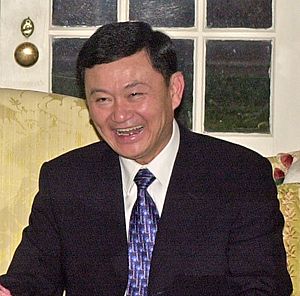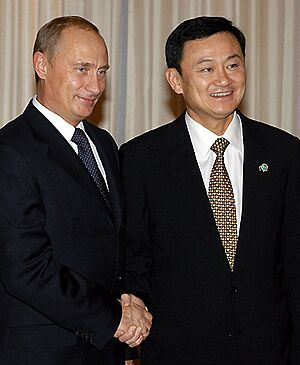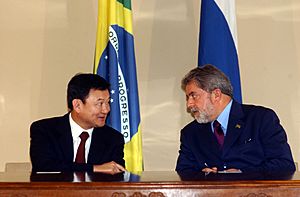Thaksin Shinawatra facts for kids
Quick facts for kids
Thaksin Shinawatra
|
|||||||||||||||||||||||||||||||||||
|---|---|---|---|---|---|---|---|---|---|---|---|---|---|---|---|---|---|---|---|---|---|---|---|---|---|---|---|---|---|---|---|---|---|---|---|
|
ทักษิณ ชินวัตร
|
|||||||||||||||||||||||||||||||||||
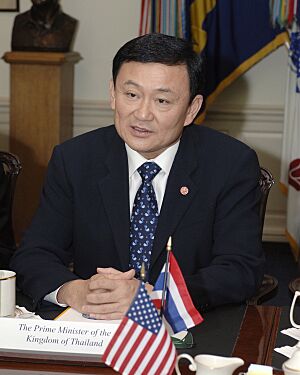
Thaksin in 2005
|
|||||||||||||||||||||||||||||||||||
| 23rd Prime Minister of Thailand | |||||||||||||||||||||||||||||||||||
| In office 9 February 2001 – 19 September 2006 |
|||||||||||||||||||||||||||||||||||
| Monarch | Bhumibol Adulyadej | ||||||||||||||||||||||||||||||||||
| Deputy |
See list
Chavalit Yongchaiyudh
Suwit Khunkitti Dej Boonlang Pongpol Adireksarn Pitak Indravithayanond Somkid Jatusripitak Korn Dabbaransi Chaturon Chaisang Prommin Lertsuridej Wissanu Krea-ngam Purachai Piumsomboon Pokin Palakul Suchart Chaovisith Thammarak Isarangkura na Ayudhaya Wan Muhamad Noor Matha Suwat Liptapanlop Phinij Jarusombat Somsak Thepsuthin Chitchai Wannasathit Surakiart Sathirathai Suriya Juangroongruangkit Suchai Charoenratanakul |
||||||||||||||||||||||||||||||||||
| Preceded by | Chuan Leekpai | ||||||||||||||||||||||||||||||||||
| Succeeded by | Sonthi Boonyaratglin (as Head of the Council for Democratic Reform) | ||||||||||||||||||||||||||||||||||
| Deputy Prime Minister of Thailand | |||||||||||||||||||||||||||||||||||
| In office 13 July 1995 – 8 November 1997 |
|||||||||||||||||||||||||||||||||||
| Prime Minister | |||||||||||||||||||||||||||||||||||
| Minister of Education | |||||||||||||||||||||||||||||||||||
| In office 14 June 2001 – 9 October 2001 |
|||||||||||||||||||||||||||||||||||
| Prime Minister | Himself | ||||||||||||||||||||||||||||||||||
| Preceded by | Kasem Watanachai | ||||||||||||||||||||||||||||||||||
| Succeeded by | Suwit Khunkitti | ||||||||||||||||||||||||||||||||||
| Minister of Foreign Affairs | |||||||||||||||||||||||||||||||||||
| In office 25 October 1994 – 10 February 1995 |
|||||||||||||||||||||||||||||||||||
| Prime Minister | Chuan Leekpai | ||||||||||||||||||||||||||||||||||
| Preceded by | Prasong Soonsiri | ||||||||||||||||||||||||||||||||||
| Succeeded by | Krasae Chanawongse | ||||||||||||||||||||||||||||||||||
| Leader of Thai Rak Thai Party | |||||||||||||||||||||||||||||||||||
| In office 14 July 1998 – 2 October 2006 |
|||||||||||||||||||||||||||||||||||
| Preceded by | Party established | ||||||||||||||||||||||||||||||||||
| Succeeded by | Chaturon Chaisang | ||||||||||||||||||||||||||||||||||
| Leader of Palang Dharma Party | |||||||||||||||||||||||||||||||||||
| In office 13 July 1995 – 17 November 1996 |
|||||||||||||||||||||||||||||||||||
| Preceded by | Boonchu Rojanastien | ||||||||||||||||||||||||||||||||||
| Succeeded by | Chamlong Srimuang | ||||||||||||||||||||||||||||||||||
| Member of the House of Representatives | |||||||||||||||||||||||||||||||||||
| In office 6 February 2005 – 7 April 2005 |
|||||||||||||||||||||||||||||||||||
| Constituency | Party-list | ||||||||||||||||||||||||||||||||||
| In office 6 January 2001 – 10 March 2001 |
|||||||||||||||||||||||||||||||||||
| Constituency | Party-list | ||||||||||||||||||||||||||||||||||
| In office 2 July 1995 – 27 September 1996 |
|||||||||||||||||||||||||||||||||||
| Preceded by | Chamlong Srimuang Suthep Attathawong Marut Bunnag |
||||||||||||||||||||||||||||||||||
| Succeeded by | Marut Bunnag Supachai Panitchpakdi Sukhumbhand Paribatra |
||||||||||||||||||||||||||||||||||
| Constituency | Bangkok 2nd | ||||||||||||||||||||||||||||||||||
| Member-elect of the House of Representatives | |||||||||||||||||||||||||||||||||||
| In role 2 April 2006 – 8 May 2006 |
|||||||||||||||||||||||||||||||||||
| Constituency | Party-list | ||||||||||||||||||||||||||||||||||
| Special Economic Adviser of Cambodia | |||||||||||||||||||||||||||||||||||
| In office 4 November 2009 – 23 August 2010 |
|||||||||||||||||||||||||||||||||||
| Prime Minister | Hun Sen | ||||||||||||||||||||||||||||||||||
| Preceded by | Position established | ||||||||||||||||||||||||||||||||||
| Succeeded by | Position abolished | ||||||||||||||||||||||||||||||||||
| Personal details | |||||||||||||||||||||||||||||||||||
| Born | 26 July 1949 San Kamphaeng, Chiang Mai, Thailand |
||||||||||||||||||||||||||||||||||
| Nationality |
|
||||||||||||||||||||||||||||||||||
| Other political affiliations |
Pheu Thai (de facto; since 2008) Thai Rak Thai (1998–2006) Palang Dharma (1994–1998) |
||||||||||||||||||||||||||||||||||
| Spouse |
Potjaman Damapong
(m. 1976; div. 2008) |
||||||||||||||||||||||||||||||||||
| Children |
|
||||||||||||||||||||||||||||||||||
| Relatives | Yingluck Shinawatra (sister) Pitaka Suksawat (son-in-law) Somchai Wongsawat (brother-in-law) |
||||||||||||||||||||||||||||||||||
| Residence | Bangkok | ||||||||||||||||||||||||||||||||||
| Alma mater |
|
||||||||||||||||||||||||||||||||||
| Occupation |
|
||||||||||||||||||||||||||||||||||
| Net worth | US$2 billion (July 2022) | ||||||||||||||||||||||||||||||||||
| Signature | |||||||||||||||||||||||||||||||||||
| Police career | |||||||||||||||||||||||||||||||||||
| Department | Royal Thai Police | ||||||||||||||||||||||||||||||||||
| Years of service | 1973–1987 | ||||||||||||||||||||||||||||||||||
| Rank | Lieutenant Colonel (revoked in 2015) | ||||||||||||||||||||||||||||||||||
| Chinese name | |||||||||||||||||||||||||||||||||||
| Traditional Chinese | 丘達新 | ||||||||||||||||||||||||||||||||||
| Simplified Chinese | 丘达新 | ||||||||||||||||||||||||||||||||||
|
|||||||||||||||||||||||||||||||||||
Thaksin Shinawatra (born 26 July 1949) is a Thai businessman and politician. He served in the Thai Police from 1973 to 1987, and was the Prime Minister of Thailand from 2001 to 2006.
Contents
Heritage and early life
Thaksin was born in San Kamphaeng, Chiang Mai Province. His family was one of the richest and most influential families in Chiang Mai.
His father, Loet Shinawatra, was an MP for Chiang Mai. When he quit politics in 1976, he became a businessman, opening two cinemas, a gas station, and a car and motorcycle dealership.
Thaksin is a Theravada Buddhist. He lived in the village of San Kamphaeng until he was 15, then moved to Chiang Mai to study at Montfort College. At 16, he helped run one of his father's cinemas.
Thaksin married Potjaman Damapong in July 1976. They have one son, Panthongtae and two daughters, Pinthongtha and Paethongtarn. They divorced in 2008. Thaksin's youngest sister, Yingluck Shinawatra (Thai: ยิ่งลักษณ์ ชินวัตร; RTGS: yinglak chinnawat), is said to have entered politics in 2011 at her brother's request as leader of the pro-Thaksin Pheu Thai Party. She was later elected prime minister on 3 July 2011. Thaksin received a doctorate in criminology at Sam Houston State University. Thaksin lectured at the Faculty of Social Sciences and Humanities of Mahidol University in 1979.
Police career
Thaksin was a member of the 10th class of the Armed Forces Academies Preparatory School, and was then admitted to the Thai Police Cadet Academy. Graduating in 1973, he joined the Royal Thai Police. He received a master's degree in criminal justice from Eastern Kentucky University in the United States in 1975, and three years later was awarded a doctorate in criminal justice at Sam Houston State University in Huntsville, Texas.
Returning to Thailand, he reached the position of Deputy Superintendent of the Policy and Planning Sub-division, General Staff Division, Metropolitan Police Bureau, before resigning his commission in 1987 as a Police Lieutenant Colonel and leaving the police. His former wife, Potjaman Damapong, is the sister of Police General Priewpan Damapong and now uses her mother's maiden name.
He is a former university lecturer at Royal Police Cadet Academy in 1975–1976.
Thaksin's police lieutenant colonel rank was revoked in September 2015.
Business career
Early ventures
Thaksin and his wife began several businesses while he was still in the police, including a silk shop, a cinema, and an apartment building. All were failures which left him over 50 million baht in debt, which is equal to £1008318.11. In 1982, he established ICSI. Using his police contacts, he leased computers to government agencies with modest success. However, later ventures in security systems (SOS) and public bus radio services (Bus Sound) all failed. In April 1986, he founded Advanced Info Service (AIS), which started as a computer rental business.
In 1987 Thaksin resigned from the police. He then marketed a romance drama called Baan Sai Thong, which became a popular success in theatres. In 1988, he joined Pacific Telesis to operate and market the PacLink pager service, a modest success, though Thaksin later sold his shares to establish his own paging company.
In 1989, he launched IBC, a cable television company. At that time, Thaksin had a good relationship with Chalerm Yoobumrung, the minister of the Prime Minister's Office, who was in charge of Thai press and media. It is a question whether Chalerm granted the right to Thaksin to establish IBC to benefit his close friend, seeing that the project had been denied by the previous administration. However, it turned out to be a money loser and he eventually merged the company with the CP Group's UTV.
In 1989, Thaksin established a data networking service, Shinawatra DataCom, today known as Advanced Data Network and owned by AIS and TOT. Many of Thaksin's businesses were later consolidated as Shin Corporation.
Advanced Info Service and later ventures
Advanced Info Service (AIS) was given a monopoly contract by Thaksin's military contacts in 1986 and used the GSM-900 frequency band. AIS grew rapidly and became the largest mobile phone operator in Thailand.
The Shinawatra Computer and Communications Group was founded in 1987 and listed in 1990.
In 1990, Thaksin founded Shinawatra Satellite, which has developed and operated four Thaicom communications satellites.
In 1999, the Shinawatra family spent some one billion baht establishing Shinawatra University in Pathum Thani. It offers international programs in engineering, architecture, and business management, though it ranks quite low in international rankings.
In 2000, Thaksin acquired the ailing iTV television station from the Crown Property Bureau, Nation Multimedia Group, and Siam Commercial Bank.
Entry into politics
Political career
Thaksin entered politics in late 1994 through Chamlong Srimuang, who had just reclaimed the position of Palang Dharma Party (PDP) leader from Boonchu Rojanastien. In a subsequent purge of Boonchu-affiliated PDP cabinet ministers, Thaksin was appointed Foreign Minister in December 1994, replacing Prasong Soonsiri. Thaksin left Palang Dharma along with many of its MPs in 1996, and founded the populist Thai Rak Thai (TRT) party in 1998. After a historic election victory in 2001, he became prime minister, the country's first to serve a full term.
Thaksin introduced a range of policies to alleviate rural poverty. Highly popular, they helped reduce poverty by half in four years. He launched the country's first universal healthcare program. Thaksin embarked on a massive program of infrastructure investment, including roads, public transit, and Suvarnabhumi Airport. Nevertheless, public sector debt fell from 57 percent of GDP in January 2001 to 41 percent in September 2006. Levels of corruption were perceived to have fallen, with Transparency International's Corruption Perceptions Index improving from 3.2 to 3.8 between 2001 and 2005. The Thai Rak Thai party won in a landslide in the 2005 general election, which had the highest voter turnout in Thai history.
Twelve years later, after Thaksin was removed from power, Chamlong Srimuang expressed regret at getting "such a corrupt person" into politics. The PDP soon withdrew from the government over the Sor Por Kor 4-01 land reform corruption scandal, causing the government of Chuan Leekpai to collapse.
PDP leader and Deputy Prime Minister under Banharn
Chamlong, strongly criticised for mishandling internal PDP politics in the last days of the Chuan-government, retired from politics and hand-picked Thaksin as new PDP leader. Thaksin ran for election for the first time for the constitutional tribunal and lost.
Thaksin joined the government of Banharn Silpa-Archa and was appointed Deputy Prime Minister in charge of Bangkok traffic. In May 1996, he and four other PDP ministers quit the Banharn Cabinet (while retaining their MP seats), prompting a Cabinet reshuffle. Many have claimed that Thaksin's move was designed to help give Chamlong Srimuang a boost in the June 1996 Bangkok Governor elections, which Chamlong returned from retirement to contest. But Chamlong lost to Bhichit Rattakul, an independent.
Chamlong's failure to buttress the PDP's failing power base in Bangkok amplified divisions in the PDP, particularly between Chamlong's "temple" faction and Thaksin's. Soon afterwards, Chamlong announced he was retiring again from politics.
Thaksin and the PDP pulled out of the Banharn-government in August 1996. In a subsequent no-confidence debate, the PDP gave evidence against the Banharn government, and in September 1996 Banharn dissolved Parliament.
Thaksin announced he would not run in the subsequent November 1996 elections but would remain as leader of the PDP. It suffered a fatal defeat in the elections, winning only one seat, and soon imploded, with most members resigning.
Deputy Prime Minister under Chavalit
On 15 August 1997, Thaksin became Deputy Prime Minister in Chavalit Yongchaiyudh's government, after the Thai baht was floated and devalued on 2 July 1997, sparking the Asian financial crisis. He held the position for only three months, leaving on 14 November when Chavalit resigned.
During a censure debate on 27 September 1997, Democrat Suthep Thaugsuban accused Thaksin of profiting from insider information about the government's decision to float the baht, but the next Democrat party-led government did not investigate the accusations.
During this period, Thaksin also served on the Asia Advisory Board of the Washington, D.C. based Carlyle Group until he resigned upon becoming Prime Minister in 2001.
The Thai Rak Thai Party and the 2001 elections
Thaksin founded the Thai Rak Thai (TRT) ('Thais Love Thais') party in 1998 along with Somkid Jatusripitak, PDP ally Sudarat Keyuraphan, Purachai Piumsomboon, and 19 others.
With a populist platform often attributed to Somkid, TRT promised universal access to healthcare, a three-year debt moratorium for farmers, and one million baht locally managed development funds for all Thai villages.
After Prime Minister Chuan Leekpai dissolved parliament in November 2000, TRT won a sweeping victory in the January 2001 elections, the first held under the Constitution of 1997. At the time, some academics called it the most open, corruption-free election in Thai history. Thai Rak Thai won 248 parliamentary seats (more than any other party previously) and needed only three more seats to form a government. Nonetheless, Thaksin opted for a broad coalition to gain total control and avoid a vote of no confidence, with the Chart Thai Party (41 seats) and the New Aspiration Party (36 seats), while absorbing the smaller Seritham Party (14 seats). Thaksin became Prime Minister of Thailand on 9 February 2001.
Prime Minister of Thailand, 2001–2006
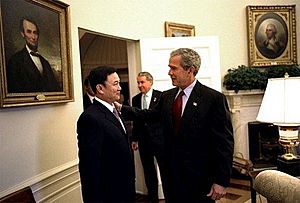
Thaksin Shinawatra was the first prime minister of Thailand to complete a full term in office, and his rule is generally agreed to have been one of the most distinctive in the country's modern history. He initiated many eye-catching policies that distinguished him from his predecessors. They affected the economy, public health, education, energy, social order, and international relations. He gained one re-election victory.
Thaksin's most effective policies were reducing rural poverty and the introduction of universal healthcare, allowing him to gather the hitherto-neglected support of the rural poor, especially in the populous northeast.
His cabinet consisted of a broad coalition of academics, former student leaders, and former leaders of the Palang Dharma Party, including Prommin Lertsuridej, Chaturon Chaisang, Prapat Panyachatraksa, Surapong Suebwonglee, Somkid Jatusripitak, Surakiart Sathirathai, and Sudarat Keyuraphan. Traditional regional power brokers also flocked to his government.
However, his government was increasingly accused of dictatorship, demagogy, corruption, conflicts of interest, human rights offences, acting undiplomatically, using legal loopholes and displaying hostility towards a free press. A highly controversial leader, he has also been the target of numerous allegations of lèse majesté, treason, usurping religious and royal authority, selling assets to international investors, and religious desecration.
September 2006 coup, conviction and exile
Thaksin was deposed in a military coup on 19 September 2006. His party was outlawed and he was barred from political activity. Thaksin lived in self-imposed exile for 15 years—except for a brief visit to Thailand in 2008—before returning to Thailand in August 2023. During his exile he was sentenced in absentia to two years in jail for abuse of power, and stripped of his Police Rank of Police Lieutenant Colonel.
From abroad, he continued to influence Thai politics through the People's Power Party that ruled in 2008 and its successor organisation Pheu Thai Party, as well as the United Front for Democracy Against Dictatorship or "Red Shirt" movement. His younger sister Yingluck Shinawatra was the prime minister of Thailand from 2011 to 2014.
Later in exile, Thaksin registered a Clubhouse account under the name Tony Woodsome, which became his moniker, and frequently held activities on the platform. He also made several announcements expressing his desire to return to Thailand on various social media platforms.
Return to Thailand
Thaksin returned to Thailand on 22 August 2023, and was promptly taken into custody. He was paroled and pardoned in 2024.
Ancestry
| Ancestors of Thaksin Shinawatra | |||||||||||||||||||||||||||||||||||||||||||||||||||||||||||||||||||||||||||||||||||||||||||||||||||||||||||||||||||||||||||||||||||||||||||||||||||||||||||||||||||||||||||||||||||||||||||||||||||||||||||||||||||||||||||||||||||||||||||||||||||||||||||||||||||||||||||||||||||||||||
|---|---|---|---|---|---|---|---|---|---|---|---|---|---|---|---|---|---|---|---|---|---|---|---|---|---|---|---|---|---|---|---|---|---|---|---|---|---|---|---|---|---|---|---|---|---|---|---|---|---|---|---|---|---|---|---|---|---|---|---|---|---|---|---|---|---|---|---|---|---|---|---|---|---|---|---|---|---|---|---|---|---|---|---|---|---|---|---|---|---|---|---|---|---|---|---|---|---|---|---|---|---|---|---|---|---|---|---|---|---|---|---|---|---|---|---|---|---|---|---|---|---|---|---|---|---|---|---|---|---|---|---|---|---|---|---|---|---|---|---|---|---|---|---|---|---|---|---|---|---|---|---|---|---|---|---|---|---|---|---|---|---|---|---|---|---|---|---|---|---|---|---|---|---|---|---|---|---|---|---|---|---|---|---|---|---|---|---|---|---|---|---|---|---|---|---|---|---|---|---|---|---|---|---|---|---|---|---|---|---|---|---|---|---|---|---|---|---|---|---|---|---|---|---|---|---|---|---|---|---|---|---|---|---|---|---|---|---|---|---|---|---|---|---|---|---|---|---|---|---|---|---|---|---|---|---|---|---|---|---|---|---|---|---|---|---|---|---|---|---|---|---|---|---|---|---|---|---|---|---|---|---|
|
|||||||||||||||||||||||||||||||||||||||||||||||||||||||||||||||||||||||||||||||||||||||||||||||||||||||||||||||||||||||||||||||||||||||||||||||||||||||||||||||||||||||||||||||||||||||||||||||||||||||||||||||||||||||||||||||||||||||||||||||||||||||||||||||||||||||||||||||||||||||||
Honours, decorations and awards
National honours
The list of national honours received by Thaksin Shinawatra has been arranged as per the Thai honours order of precedence.
 Thailand:
Thailand:
- 1996 –
 Knight Grand Cordon (Special Class) of the Most Exalted Order of the White Elephant
Knight Grand Cordon (Special Class) of the Most Exalted Order of the White Elephant - 1995 –
 Knight Grand Cordon (Special Class) of the Most Noble Order of the Crown of Thailand
Knight Grand Cordon (Special Class) of the Most Noble Order of the Crown of Thailand - 2001 –
 Knight Grand Cross (First Class) of the Most Admirable Order of the Direkgunabhorn
Knight Grand Cross (First Class) of the Most Admirable Order of the Direkgunabhorn - 2002 –
 Knight Grand Commander of the Most Illustrious Order of Chula Chom Klao
Knight Grand Commander of the Most Illustrious Order of Chula Chom Klao - 2003 –
 Boy Scout Citation Medal of Vajira, First Class
Boy Scout Citation Medal of Vajira, First Class
- 1996 –
All royal decorations were recalled by King Rama X per the Royal Gazette published on 29 March 2019
Foreign honours
Academic rank
- 2007 – Visiting Professor of Takushoku University in Tokyo, Japan
Awards
- Asean Business Man of the Year, from ASEAN Institute for Peace and Reconciliation (AIPR), in 1992
- Telecommunication Development for Social Welfare Award of 1993 from Telecommunication Society of Thailand
- The 1993 Outstanding Telecom Man of the Year Award, honored by the Singapore Business Times as 1 of 12 Leading Asian Businessmen
- Asian CEO of the Year
- Honorary Doctor of Arts (Communication Arts) (Thammasart University, Thailand)
- First Thai to be granted "Lee Kuan Yew Exchange Fellowship" (Singapore)
- 1 of 50 Influential people in The World from Time magazine
- 1 of 3 Thai-Filipino Relations Goodwill from Ambassadors Philippines Embassy in Thailand
- Outstanding Criminal Justice Alumnus Awards from Sam Houston State University
- Distinguished Alumni Award from Sam Houston State University
- The honorary award from the Mass Media Photographer Association of Thailand
- International Forgiveness Award 2004
- Honorary doctorate degree from Plekhanov Russian Academy of Economics
- The ABLF Statesman Award 2012
See also
 In Spanish: Thaksin Shinawatra para niños
In Spanish: Thaksin Shinawatra para niños
- List of prime ministers of Thailand
- Thailand political crisis 2005-2006
- Thaksinomics
- Seng Saekhu
- Sondhi Limthongkul
- People's Alliance for Democracy
- Constitution of Thailand


